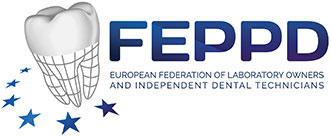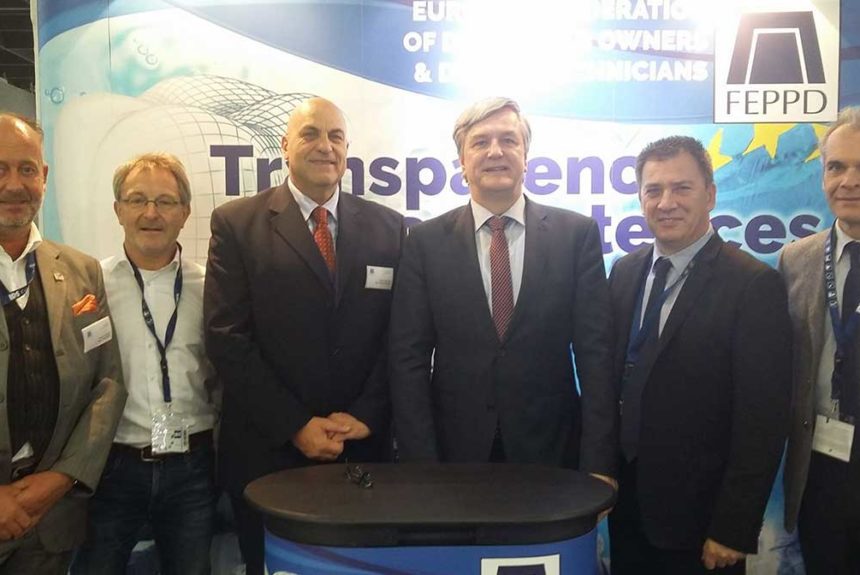From the 21st until the 26th of March 2017, FEPPD and its board presented on IDS Cologne, Germany. (Hall 11.1 Stand F029)
Interview with FEPPD: “We are bound to learn new technologies”
Representing 40,000 dental laboratories and 210,000 dental technicians in Europe, the Federation of European and International Dental Technicians (FEPPD) is a key player in the dental trade industry. Founded in 1953, FEPPD evolved from representing manufacturers to promoting European dental technology worldwide. Dental Tribune International had the exclusive opportunity to talk to the Board during IDS 2017. Among the much discussed topics were the new medical devices regulation and its consequences for dental technicians.
How have dental technicians responded to the vast changes that have been brought to this industry over the last 20 years?
There are differences between member states of the European Union, whereby dental technicians are considered in some countries as healthcare professionals and in others as craftspeople. We find that there is common ground when a student persists in higher education, as the services they can then offer upon becoming a dental technician are often standardized. With this in mind, we are working on creating a more modular way for dental technician education to be performed so that there is a greater freedom of movement throughout Europe for dental technicians.
How does the FEPPD then promote education throughout Europe?
We have participated in a number of EU-funded programs regarding dental education, and this issue will be discussed in depth at our next annual general meeting from 2-3 June 2017. If we are able to make sure that education is a priority, it will be the European patient who will ultimately benefit from this, as we will be able to provide the same results and services irrespective of their location.
We are bound to learn new technologies, as they are pushing dentistry into new areas. It is essential, then, that the training received by dental technicians involves learning how new innovations are used. However, it is important for dental technicians to gain confidence in not just new technologies but new materials such as zirconia.
Are you concerned that more dental technologies seem to be taking their services away from the dental technician and straight to the dentist?
Well, we see the future as having more specific rules for dental technicians and dentist alike regarding the use of certain systems. It will become more important for dental technicians to have knowledge of how these systems work, as many dentists may need help with their operations, regularising themselves within the MDR.
As far as these technologies and systems are used properly and in accordance with regulations, we have no problem. Our issue arises when third parties offer solutions without being registered or compliant with regulations. That is why we are focused on ensuring that not only are regulations followed by individuals, but that the competent governing bodies enforce them. This is a profession that has been around for many years, and the rules that govern it are crucial for maintaining a high level of trust from patients.
We want dental technicians to deliver the highest safety standards towards patients. We also aim for a full transparency of the manufacture of dental devices. Certainly, we represent a very important sector. The new Medical Devices Regulation should help us to ultimately deliver the best service to the European patient.
How important should certification and accreditation of the dental devices be for dentists and patients? What should be the role of the EU when setting standards and certification?
One of the fundamental changes brought by the new MDR, is that the Certificate of Compliance, denoting the manufacturing source, materials used, and the provenience of the custom made device, whether it is EU based or otherwise imported from the Asian market, will now be mandatory to reach the European dental patient. In consumer terms, this will be finally rendering awareness to dental patients, also in value for money of the devices they opt to get from whichever country their dental device will originate.
Dental Labs and dental technicians fabricating such devices, will in return receive accreditation in being the rightful manufacturer to the attention of the dental patient at large. This is something FEPPD has worked at length to achieve, gaining a win-win situation to both the dental patient, and the legal entity supplying dental devices. Full compliance by the dentists is thus expected in respect to what the MDR solicits in respect to the end user.
The new medical devices regulation has just been passed. It includes new provisions such as new scrutiny regulations for dental manufacturers which will greatly affect the dental trade sector. What is your opinion and expectation concerning the new regulations?
At face value, the Regulation should reach its purpose of securing the best interests of the dental patient, provided that all prerequisites, as laid down in the document, be observed and handled properly by the local competent authorities at all times. With the outgoing MDD, there occurred deficiencies in implementing it to the full.
Failing strict surveillance, the enormous load of management that the Regulation will be imposing on dental Labs, will only become more of an economical hindrance. The same observation has been already noted by other stakeholders in the dental field.
Surely, a less complicated Regulation, would have been easier to pursue, obtaining the same transparency towards the dental patient. Having said this, FEPPD will still be seeing to the proper implementation of the MDR. We are already looking into loopholes raised by misinterpretation of third parties, in trying to exclude themselves from being compliant to the Regulation. The success of the MDR will only unfold, if there is a level playing field for all players adopting the same regulatory criteria.



Leave a Reply